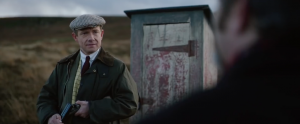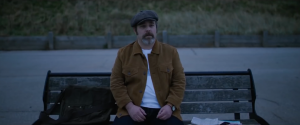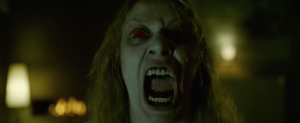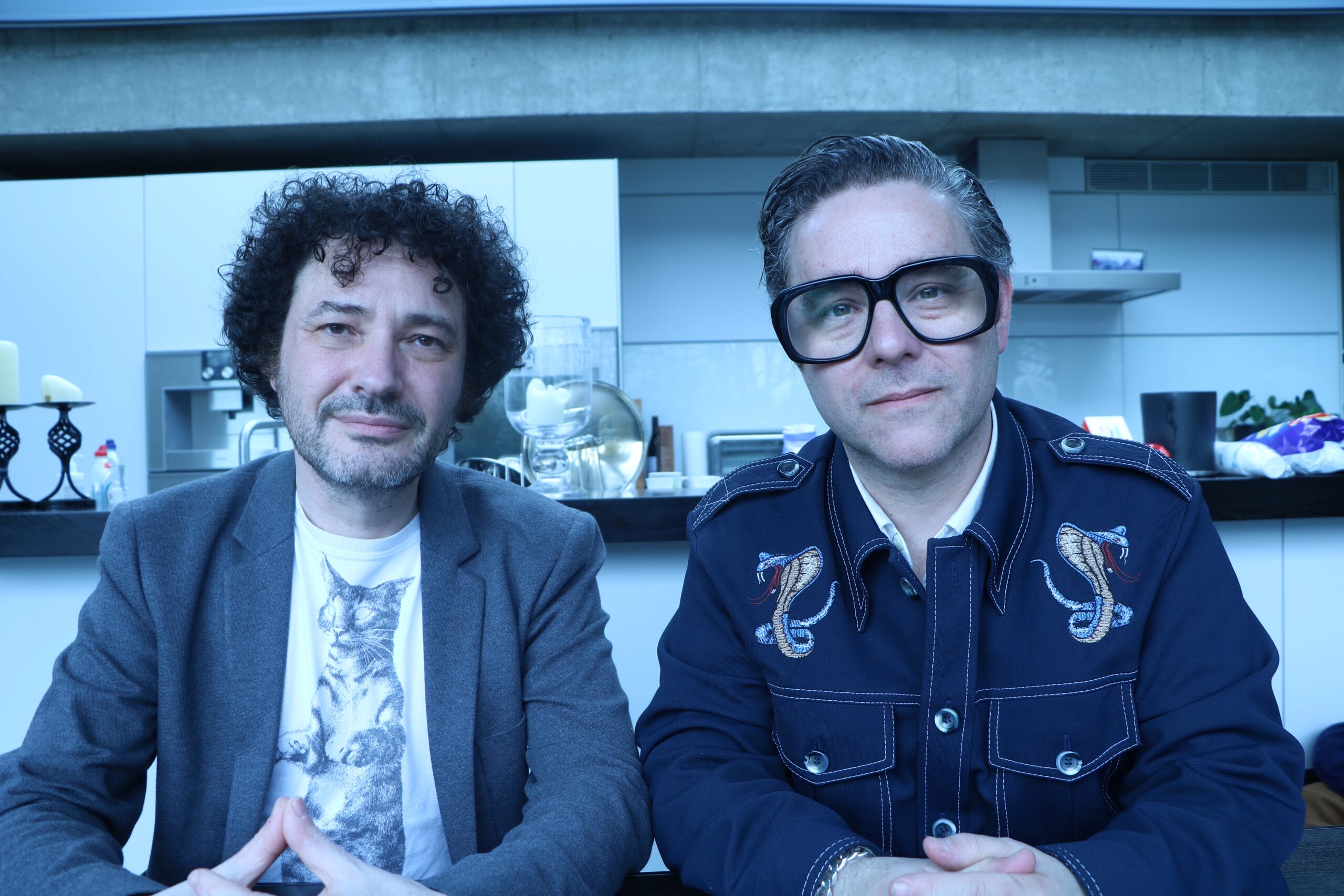In a house overlooking London’s Highgate Cemetery, amongst the beautiful architecture of the dead, Our Culture sat down with directors Jeremy Dyson and Andy Nyman to talk about their upcoming chiller, Ghost Stories. It is a deeply unsettling film, one which forces the audience into the dark, into the places where unnatural things tread.
In speaking with these directors, one is immediately hit with their palpable affection for horror; both directors throwing out classic horror references left and right, from Night of the Demon to Amicus Productions. It truly makes you excited for their film because you’re aware of the deep love of film from which it spawned.
The following is a complete transcription of that conversation. Warning, swearing is contained in this interview.
First of all, I’d like to say thank you ever so much to both of you for talking to Our Culture.
Jeremy: It’s our pleasure!
Andy: We’re delighted! Thank you!
To start, I’d love to know how the film got off the ground. Once the decision was made to go from stage to screen, how did you guys go about that?
Jeremy: Well it was, you know, it was quite a long journey that began when, in the very first week of us writing the play, we sensed as we came up with the story, that it had cinematic potential. But, we were quite disciplined at that time, saying “well yeah but we’re doing this play so all our focus will remain on the play and we’ll just park that as a thought” And then when it transferred into the West End, and there was a lot of, you know, heat and noise around it, we had a Hollywood offer from a major studio. That caught us by surprise but we wouldn’t have been allowed to direct it. It would have been to write the script and then hand it over, and we knew that that wasn’t…
Andy: It just didn’t feel right.
Jeremy: Didn’t feel right, yeah. It wasn’t going to satisfy us. It wasn’t the spirit that we’d set out to do the play in. And then there was another offer after that.
Andy: By then, we’d decided that we wanted to write it, we wanted to direct it, and I wanted to play [Professor] Goodman. We were sort of unshakeable on that because we’d decided that we wanted to retain as much of the spirit of the play as we could, including its British-ness. So then there was another very lovely American offer that came through and we spoke to them and they were onboard for us to do that, but the harsh reality of that was that there would have been a lot of forces outside of our control.
Jeremy: We would have had to give up quite a bit.
Andy: Yes, and we just went away from that whole experience thinking, “it’s not like we’re going to get paid £2 million each”, you know. The realities of writing a small, independent film are that you’re not going to get much money. And those offers were somewhere between not much money and fuck-all money.
Jeremy: [Laughs]
Andy: So, you sort of think, “well, if we’re going to get paid fuck-all, we might as well just do it ourselves, and write it ourselves, and try and pick the people we want to make it with” And I should say as well that those offers, it’s not like anyone’s going out to shaft you, it’s just the way it all works.
Jeremy: There’s just not that much money in low-budget films!
Andy: So, that’s what we decided to do, and we took eighteen months, because it’s not like we’re not doing anything. We’re both doing our own stuff. We took eighteen months on unpicking it and working, and one thing I’ve really learnt from Jeremy is he’s got the most amazing worth ethos and discipline, but also, you know, something he says a lot is “trust the process” and taking that time pressure away from you and just being able to let solutions find themselves in your subconscious has actually been a really exciting and useful way to work.
Jeremy: So, all the way through to completing the film and post-production, the principle was always trying to go for absolute authenticity of what we felt was the right way to go with it on every creative decision. And not out of any self-aggrandising arrogance, just that that felt like the best way of achieving what we’d set out to do. It was the same thing on the play, and historically, things always come out better when I’ve done that in my own career.
Andy: And also, the films that we love, especially within the genre where there’s an opportunity to see people demonstrate their personalities in the extreme, all of the films that have touched us most are films where you feel you’re getting to know what the filmmaker’s like, you know, be that John Landis, be that Tobe Hooper, Eli Roth.
Jeremy: Well it’s interesting, it goes back to Amicus Productions. They were informed by that spirit. You know, the Amicusses, [Milton] Subotsky was a complete genre freak. He adored the stuff. And Max Rosenberg was a businessman, but of course, he had the brains to let Subotsky take the creative side of it. It’s brilliant to know that they had a similar spirit that informed the things that we loved, historically.

In watching the film, one gets an unmistakable air of M.R. James and, in particular, stories like Whistle and I’ll Come to You. How much of an influence was M.R. James on the film?
Jeremy: Well it was the adaptations that were the influence, you know, the Lawrence Gordon Clark ones. There’s another genius! How brilliant that somebody like that emerged out of the BBC just because that’s how the BBC operated in the seventies! It was, “as long as you don’t spend too much money, you can go and do what you want!”
Andy: [Laughs]
Jeremy: And he was a documentary maker! But he had a passion for those stories that went back to him being told them by his father at Christmas, I think.
Andy: And those versions, you know, are some of the greatest ghost stories ever put on film.
Jeremy: That’s no hyperbole, that’s for sure!
A Warning to the Curious is still utterly frightening!
Andy: Oh my God, yeah! And Lost Hearts!
Jeremy: And, you know, you look at how he achieved it and there’s so many clues how to go about it yourself. He had no money, so it meant intense creativity, but he cast it brilliantly, you know, and the locations do so much work. And then, they’re beautifully shot. And all those things don’t have to cost money.
Andy: And the sound as well! And the editing, I mean, honestly, they are remarkable. You think about the end of The Treasure of Abbott Thomas. Oh my God! That trick’s almost just edit and sound, and it just makes you go cold.
Jeremy: Well it’s timed like a joke.
Andy: It is.
Jeremy: It’s timed like a piece of comedy. He had grand aspirations, Lawrence Gordon Clark, he’s quite open about it. He thought he loved Hitchcock and he thought of himself as Hitchcock and how would Hitchcock do this? In A Warning to the Curious, you’ve got that great shot of the spade on the suitcase.
Andy: Yes, absolutely!
Jeremy: You know, brilliant cinematic storytelling! Telling you who this character is through dynamic camera work!

And in films like Night of the Demon…
Jeremy: Which we share a passion for!
…there’s such an emphasis on the power of suggestion.
Jeremy: Yeah! But the fascinating thing about Night of the Demon is that it has this dual thing of one, it’s the power of suggestion, but two, it couldn’t be more balls-out with its monster! And for years, people were sniffy about it, but you know, I love the hutzpah of showing that demon!
That shot where it’s coming out of the smoke is horrifying to this day!
Andy: It is! We watched it again recently and we were like “…fuck” That is something!
Jeremy: It’s brilliantly done! So yeah, go on, sorry!
So, why do you think that the power of suggestion is so scary?
Jeremy: [Chuckling] Because you’re weaponising the audience’s imagination against themselves! We looked into it a lot when we were staging the play and there’s so much of it that’s neurobiology. A lot of what that feeling is when you’re scared by something in a film, or indeed in a theatre, is the prey response. It’s a very old circuit in the brain, and you’re accessing that bit of the audience’s brain and putting them into that ancient response that goes back to, you know, us being crustaceans!
Andy: And we’re not snobby about the period of horror films at the moment. We think there’s been a brilliant golden age, we think there’s been some absolutely fantastic genre films over the past fifteen, twenty years. I mean, amazing, but one of the things that kind of comes and goes that is something that maybe Get Out really tapped into so brilliantly…
Get Out was brilliant!
Jeremy: Oh yeah!
Andy: …is a sense of wrong. It’s a sense of the real world.
Jeremy: Oh so the moral element!
Andy: No, more so meaning…
Jeremy: Oh you mean…
Andy: …off-kilter!
Jeremy: Off-kilter, yeah!
Andy: There is just something…wrong.
Jeremy: But what’s interesting is that that “something wrong” resonates with the moral aspect.
Andy: One hundred percent.
Jeremy: It’s the one allied to the other.
Andy: Exactly.
Jeremy: And Night of the Demon does the same thing, you know, one of the secret weapons of Night of the Demon is Niall MacGinnis’ performance, and it’s in the script, when he’s talking to his mother and saying “you like how we live, well it came at a price, and that price is fear” And it’s brilliant! It’s saying something profound about corruption!
Andy: [Chuckles] At the risk of being political, that could be a sentence to come out of the mouth of, you know, a President…or a Prime Minister…or the head of a massive global company.
Jeremy: So, you know, when that monster comes out of the darkness, and it’s coming to get you, it means something. And that’s why you feel it. It’s not just a technical thing, it’s a story thing, it’s narrative.

Yeah, absolutely! One of the most horrifying aspects of Ghost Stories, with regards to the off-kilter feeling, is how real it all feels. Could you tell us a bit about the practical effects element of the film?
Andy: Absolutely! We both love magic, conjuring, and always have done. And I’ve worked extensively in that world as a sort of parallel career to my acting. And there’s something really interesting about my own experience of watching films where there’s lots of CGI, and I’m sure it’s a sort of universal experience, which is that there’s a disconnect because it doesn’t hit you on an emotional level. You’re so au fait to seeing anything happen that it just negates it. And as a magic trick, it becomes null and void. If you think about The Spy Who Loved Me, with that ski sequence at the beginning, your stomach when he goes off the cliff…you can’t believe what you’re seeing.
Jeremy: And the same in Moonraker! I showed it to my kids and it was the same thing. They are jumping out of a plane! And that is for real!
Andy: So, the difference between that and when you see the CGI version of that where it has no impact other than sort of “oh it’s a moment in a film”, they’re very, very different things. And so as a magic trick, you’re conditioned, you know what’s real and what isn’t. This is aside from the benefits of doing it live because it’s cheaper and the benefits of doing it live because of the performances of an actor, I’m purely talking about the audience experience of seeing it. And so, it was really important to us. We knew we could do it eight times live on stage with bits of string and sellotape and there’s no reason why you can’t transfer that to film. We used to have this expression which was “Buster Keaton filmmaking” which is, you know, we’ve used techniques that are…
Jeremy: [Chuckles] that go back to George Méliès!
Andy: Yeah! And so one of the exciting things about that when you’re dealing with a story which is about not quite knowing what’s real and what isn’t real, is that if you can put the audience in the same shoes as someone experiencing it on the screen, that’s a really useful technique. And there are moments I look at, and I promise I don’t mean this in an arrogant way, where I think “I wish I didn’t know that was coming” because it’s so exciting to know that what an audience thinks they’re looking at is not what they’re looking at and you can’t wait for them to have revealed to them what they’re actually looking at!
Well, thank you ever so much Andy and Jeremy for sitting down with me. It’s been an absolute pleasure!
Andy: Thank you so much, and thank you for your support!
Jeremy: Yes, thank you!
Ghost Stories is released in the UK on the 6th of April and in the United States on the 20th of April.
Special thanks must be given to Lionsgate for their help in arranging this interview.

